

Des données et des paiements : un nouvel axe stratégique pour les banques. L’industrie des paiements électroniques en France, en Europe et dans le monde vit au rythme d’une véritable frénésie d’événements, d’annonces et de décisions.

Dans un marché devenu intensément mouvant et concurrentiel (ruptures technologiques, pressions réglementaires, nouveaux entrants, diminution des marges…), tout ce qui touche au cross-canal, au parcours client, aux modalités d’interaction et aux nouveaux modes de paiement revêt une importance croissante, pour conserver le leadership de la relation client et pérenniser les revenus associés. De nouveaux business s’imposent Par ailleurs, il est désormais avéré que de nouveaux business se sont imposés avec la montée en puissance d’Internet, relayée par les phénomènes Mobile et Solomo (voir Glossaire). Les opportunités des établissements financiers… Pour les commerçants, par exemple, elles peuvent : Concernant les clients et titulaires de cartes bancaires, il leur est possible : …en phase avec la réglementation… … et les attentes des clients. CardSpring Raises $10 Million To Connect Payments To The Web.
We measure every last click when it comes to the Web, but there remains a gulf between online and the real world.

Yet the online world increasingly drives behavior offline, especially when it comes to purchasing habits. How many times have you researched something online or on your mobile phone before buying it? Yet when you go to a store to buy it, everything you did online might as well disappear as far as the merchant is concerned. It doesn’t have to be that way. The last mile in local commerce is really only the last few inches between the credit card in your outstretched hand and the card swipe at the register. That is the question a group of former Netscape engineers and executives are trying to answer with a new startup called CardSpring launching in private beta today. These applications could include things like electronic coupons, loyalty cards, virtual currencies, or yet-to-be-imagined commerce apps. Walther once ran Netscape’s platform group.
Natural models of markets. I've written quite a bit about the shortcomings of traditional economic models of markets.
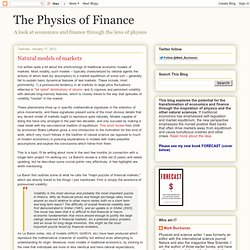
Connecting the Dots. Wall Street Conquers Big Data on the Web. With the explosion in Internet content, traders and investment managers increasingly are looking for tools to help them mine the web's vast stores of unstructured data to identify trading signals, predict future events and gain an edge.
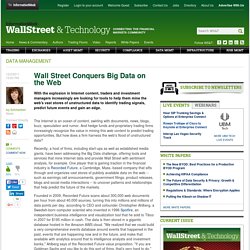
The Internet is an ocean of content, swirling with documents, news, blogs, buzz, speculation and rumor. And hedge funds and proprietary trading firms increasingly recognize the value in mining this web content to predict trading opportunities. » Please Give Feedback Aden Davies. How much data do you think a bank captures about you?
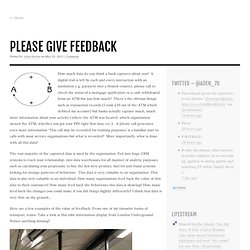
A digital trail is left by each and every interaction with an institution e.g. payment over a branch counter, phone call to check the status of a mortgage application or a cash withdrawal from an ATM but just how much? There’s the obvious things such as transaction records (I took £10 out of the ATM which debited my account) but banks actually capture much, much more information about your activity (where the ATM was located, which organisation owned the ATM, whether you got your PIN right first time etc.). Can Big Data in Finance Lead to New Metrics?: Tech News and Analysis « This week at South by Southwest, I met with a cool startup called DueDil, which is trying to provide a Lexis-Nexis-meets-Google-meets-LinkedIn style of service that aggregates public data on companies from a variety of databases, then uses that to create new metrics to indicate how solvent or successful the business is and will continue to be.
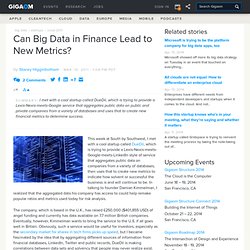
In talking to founder Damian Kimmelman, I realized that the aggregated data his company has access to could help remake popular ratios and metrics used today for risk analysis. The company, which is based in the U.K., has raised £250,000 ($401,855 USD) of angel funding and currently has data available on 7.7 million British companies. Eventually, however, Kimmelman wants to bring the service to the U.S. if all goes well in Britain. What we mean by “reinventing business research” You may (or may not) have seen that two weeks ago, together with Horace Dediu of Asymco, we published an interactive report about the state of the global mobile phone industry.
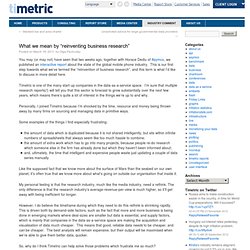
This is our first step towards what we’ve termed the “reinvention of business research”, and this term is what I’d like to discuss in more detail here. Data-driven finance: Go figure. ASKING a friend for a loan is a quick way to tide you over till the end of the month.
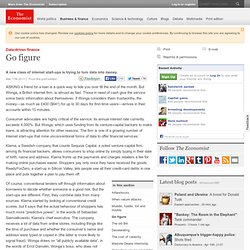
But Wonga, a British internet firm, is almost as fast. Those in need of cash give the service some basic information about themselves. If Wonga considers them trustworthy, the money—as much as £400 ($641) for up to 30 days for first-time users—arrives in their accounts within 15 minutes. Consumer advocates are highly critical of the service: its annual interest rate currently exceeds 4,000%.